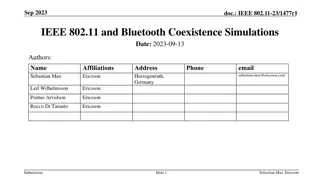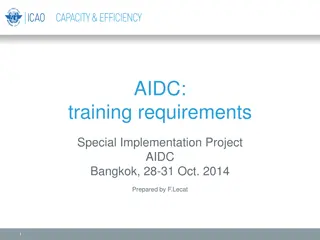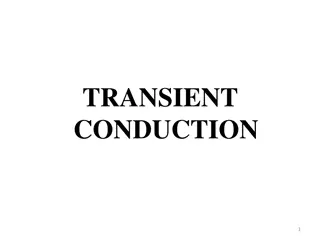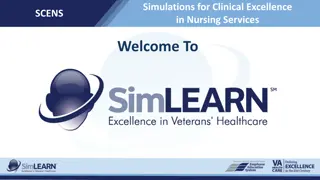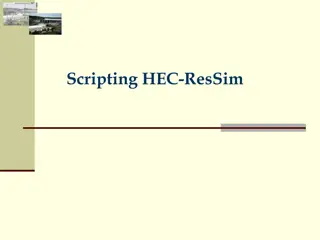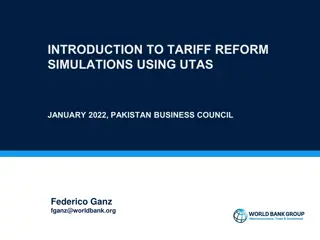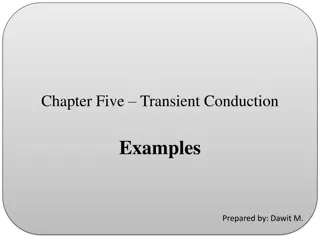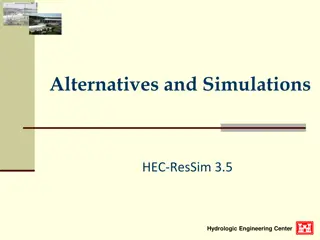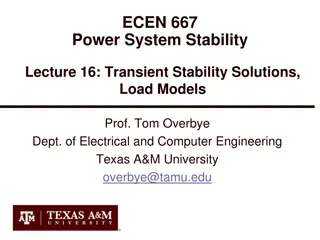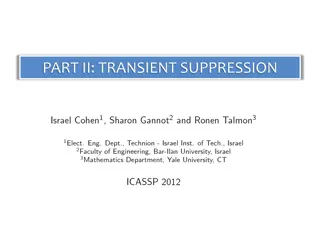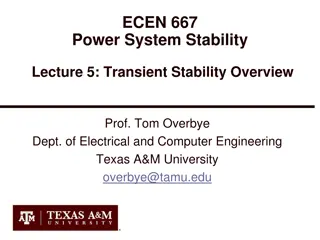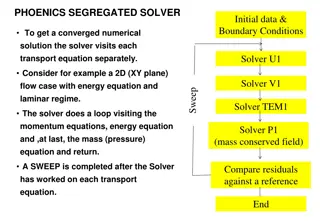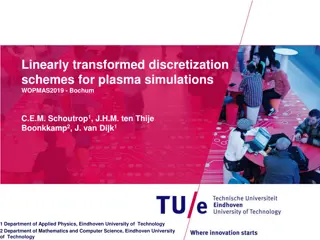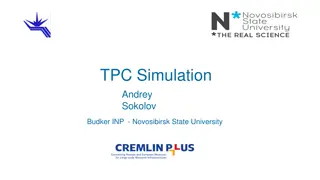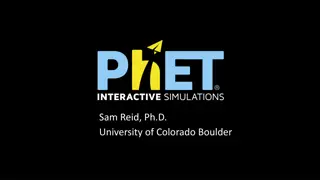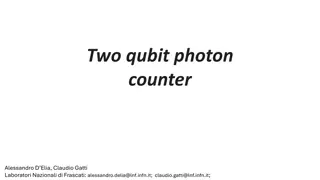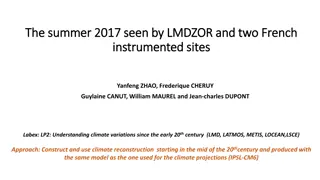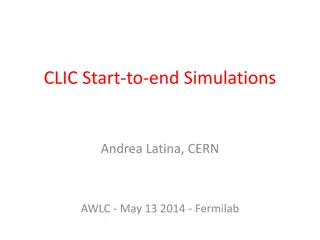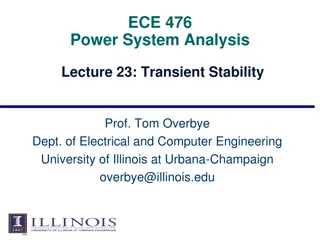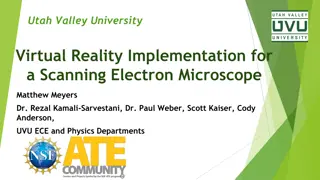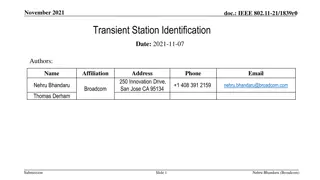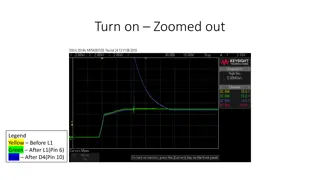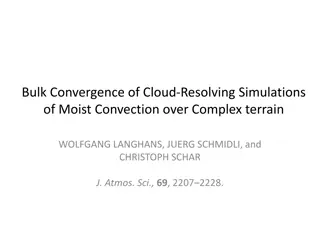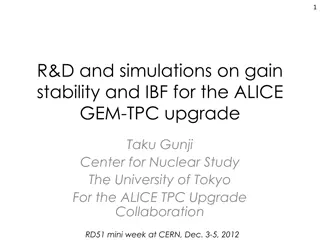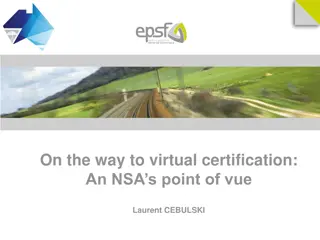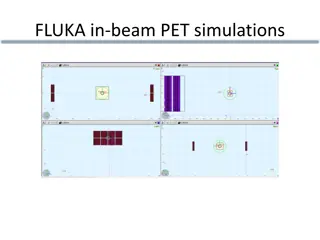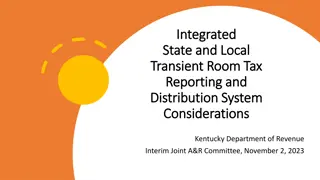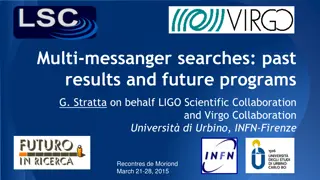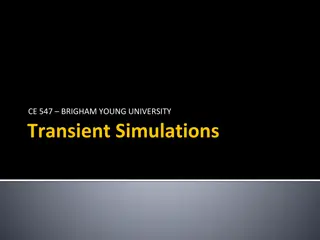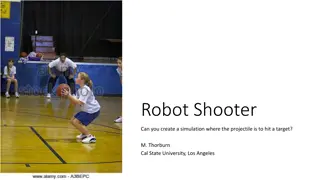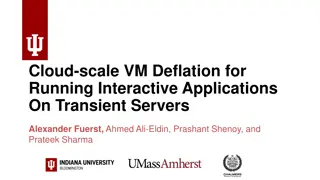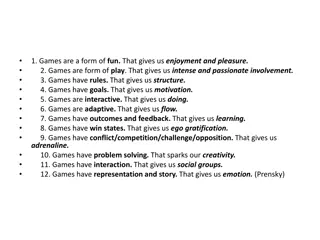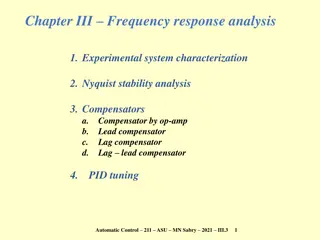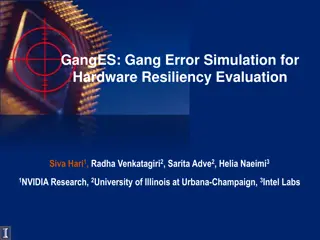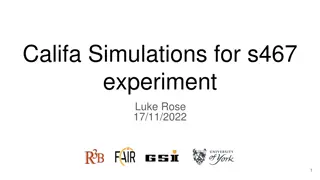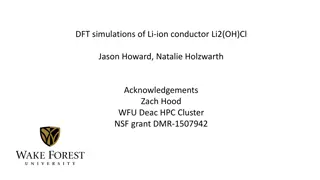Evaluation of CORDEX Experiment in South Asia using RegCM5
This study analyzes the CORDEX Evaluation Experiment in South Asia through dynamical downscaling using RegCM5 based on ERA5 data. It highlights the need for more RCM simulations in the region, showcases the use of ICTP.RegCM5, describes the dynamics and physics options in the evaluation simulation,
0 views • 8 slides
IEEE 802.11 and Bluetooth Coexistence Simulations: Assumptions and Models
This document presents simulations on the coexistence of IEEE 802.11 (Wi-Fi) and Bluetooth technologies in the 5.945GHz to 6.425GHz spectrum. It explores various assumptions and models, including spectrum usage, channelization, scenario setups for Bluetooth and Wi-Fi links, and the capabilities of b
6 views • 54 slides
Understanding Different Types of Scripts in HEC-ResSim
Explore the two main categories of scripts in HEC-ResSim - scripts executed outside simulations and scripts executed during simulations. Learn about the functions and properties of each type, including scripted rules and state variable scripts. Discover how these scripts compute flow limits, store m
6 views • 23 slides
Enhancing Health Data Usage for Transient Populations in Malawi
Exploring the challenges and successes in using health data for transient populations in Malawi, this presentation covers migration trends, potential opportunities, and recommendations for data use and exchange. Case studies illustrate the complexities of managing health data for mobile populations,
1 views • 15 slides
Training Requirements and Implementation Project Overview
This document outlines the training requirements and implementation steps for the Special Implementation Project in AIDC Bangkok. It covers general steps for developing simulations and procedures, specific training needs for ATCOs, FDOs, ATSEPs, and other staff, as well as understanding system roles
0 views • 8 slides
Understanding Transient Conduction in Heat Transfer
Transient conduction in heat transfer occurs when boundary temperatures change, causing temperature variations within a system until a steady state is achieved. This phenomenon is commonly seen in processes like quenching hot metals. The Lumped Capacitance Method is used to analyze such scenarios, i
0 views • 55 slides
Clinical Excellence in Nursing: SCENS Simulations for Disruptive Behavior Management
SCENS provides simulations focusing on Prevention and Management of Disruptive Behavior (PMDB) in nursing services, emphasizing safety protocols and effective communication. The training covers early signs of escalating behavior, stress levels recognition, and interventions to handle disruptive situ
0 views • 19 slides
Understanding Scripting in HEC-ResSim
Explore the two categories of scripts in HEC-ResSim - executed outside simulations and during simulations. Learn about static scripts for pre-processing, running simulations, and post-processing, along with the tools like Script Selector and Script Editor for script execution and editing.
0 views • 34 slides
Understanding Tariff Reform Simulations Using UTAS
This presentation introduces tariff reform simulations using UTAS in the context of the car economy example. It covers how tariffs on imported goods impact production costs and effective protection of domestic industries. Key concepts such as output tariff, upstream tariff, and effective protection
0 views • 15 slides
Transient Conduction in Thermal Energy Storage Units and Cylinders
Explore examples of transient conduction phenomena in thermal energy storage units, cylinders, and spheres. Learn how to calculate time durations, temperature changes, and energy removal rates during these heating and cooling processes. The examples cover scenarios involving aluminum slabs, oil bath
0 views • 10 slides
HEC-ResSim Alternatives and Simulations Overview
Explore the functionalities of HEC-ResSim including creating, composing, and setting up alternatives for hydrological engineering simulations. Learn about ResSim alternatives, simulation modules, and the alternative editor in detail.
0 views • 31 slides
Power System Stability Lecture: Transient Solutions and Load Models
This lecture delves into transient stability solutions and load models in power systems. It covers the simultaneous implicit method for solving algebraic and differential equations, focusing on the Trapezoidal approach for linear systems. The discussion extends to nonlinear cases, particularly using
0 views • 47 slides
Understanding Transient Interference Suppression in Speech Enhancement
Transient interference, characterized by abrupt sounds followed by decaying oscillations, poses a challenge for standard speech enhancement algorithms. This article delves into the statistical modeling and problem formulation of transient suppression, exploring band-to-band filters, spectral varianc
5 views • 11 slides
Power System Transient Stability Overview: ECEN 667 Lecture Summary
This summary covers the key points discussed in the lecture on transient stability in power systems by Professor Tom Overbye at Texas A&M University. Topics include contingency analysis, results interpretation, PowerWorld Simulator usage, plotting results, and more. Detailed information is provided
0 views • 43 slides
Efficient Solver Techniques in CFD Simulations
This resource provides insights into the segregated solver approach in computational fluid dynamics (CFD) simulations, specifically focusing on the sweeping direction and its impact on computational efficiency and convergence rates. It discusses the benefits of employing the XY plane for 2D cases to
1 views • 50 slides
Linearly Transformed Discretization Schemes for Plasma Simulations
Addressing the computational challenge of CO2 decomposition with plasmas, this study focuses on developing advanced discretization schemes and modern iterative linear solvers to ensure physical invariants are respected. The research explores the use of chemical invariants to simplify complex systems
0 views • 22 slides
Cutting-Edge TPC Simulation Techniques at Budker INP & NSU
Cutting-edge TPC simulation techniques implemented by researchers at Budker INP and NSU include framework implementations, event displays, background simulations, track distortions, and gas medium simulations. Researchers like Andrey Sokolov, Lev Shekhtman, Vijayanand KV, and Timofey Maltsev have co
0 views • 15 slides
Interactive Science Simulations by PhET - Engaging Learning Experiences
Explore PhET Interactive Simulations founded by Nobel Prize physicist Carl Wieman, offering over 120 interactive simulations across various scientific disciplines. From Energy Skate Park to Molecule Shapes, these simulations provide engaging, game-like experiences for students and scientists alike.
0 views • 13 slides
Quantum Circuit Simulations and Electromagnetic Analyses in Quantum Photonics
Explore the world of quantum photonics with insights into two-qubit photon counters, jointed cavities, qubit pads, and quantum circuit simulations. Ansys simulations and experimental data by researchers Alessandro D'Elia and Claudio Gatti provide in-depth analysis of quantum phenomena. Discover the
0 views • 7 slides
Insights into Summer 2017 Climate Variations and Heatwave Events
Climate research using climate reconstructions and model simulations for summer 2017, focusing on heatwave periods and temperature anomalies. Observations from instrumented sites and atmospheric soundings were utilized to analyze air temperature, soil moisture, and radiation. The study highlights th
0 views • 22 slides
CLIC Start-to-End Simulations Overview
Review of CLIC start-to-end simulations including main simulation codes, past results, and upcoming work. Focus on realistic performance assessments, tolerance evaluations, emittance transport, mitigation techniques, operational scenarios, luminosity studies, and tools used. Detailed information pro
0 views • 12 slides
Power System Analysis Lecture: Transient Stability with Prof. Tom Overbye
In Lecture 23 of ECE 476, Prof. Tom Overbye discusses transient stability in power systems. Topics include power system time scales, frequency variations, dynamics behavior, grid disturbances, and power flow analysis. Announcements regarding assignments and exams are also highlighted.
1 views • 25 slides
Utah Valley University - Virtual Reality Implementation for Nanotechnology Education
Utah Valley University (UVU) introduces a nanotechnology course this fall, leveraging VR simulations to train students in nanofabrication and characterization techniques such as photolithography, electron beam lithography (EBL), sputtering, and microscopy. The VR simulations help students familiariz
0 views • 8 slides
Proposal for Transient Station Identification in IEEE 802.11-21
TGbh use cases necessitate a form of Identity for Non-AP STAs for access control. This proposal delves into the concept of a Transient ID, detached from a MAC address, to support use cases securely. It explores the generation and validation of Transient Identity (TSID) and its key (TSIDK) in conjunc
0 views • 13 slides
Understanding Transient Behavior in Electrical Systems
Explore the transient behavior in electrical systems through a series of zoomed-in and zoomed-out images depicting different stages during power transitions. Follow along as signals oscillate, square shapes are lost, and switches are cycled, offering insights into system behavior under various condi
0 views • 12 slides
Analysis of Cloud-Resolving Simulations Over Complex Terrain
Examining cloud-resolving simulations of moist convection over complex terrain using large eddy simulation (LES) and deep convective fluxes. The study includes characteristics of the simulations, numerical convergence, and turbulent diffusion. Results reveal insights into the behavior of convective
0 views • 20 slides
R&D and Simulations on Gain Stability and IBF for ALICE GEM-TPC Upgrade
The research and development efforts, along with simulations, focus on enhancing gain stability and addressing issues related to Ion Back Flow (IBF) for the ALICE GEM-TPC upgrade. Detailed outline, status updates, and major challenges are discussed, highlighting the significance of the upgrade for i
0 views • 24 slides
The Evolution of Virtual Certification in NSA Perspective
The journey towards virtual certification, as seen through the lens of an NSA, involves navigating expensive, time-limited, and location-limited processes. The classic process involves safety demonstrations, risk analysis, and virtual simulations, highlighting the advantages and drawbacks of testing
0 views • 11 slides
Advanced Imaging Simulations for Hadrontherapy and PET Procedures
Explore advanced FLUKA in-beam PET simulations and Hadrontherapy activity-based generator for precise treatment planning. Speed up simulations using cloud computing and bias activity-based generators for faster workstation processing. Understand components needed for hadrons treatment simulation, in
0 views • 11 slides
State and Local Transient Room Tax Reporting System Considerations
The Kentucky Department of Revenue discussed the costs and benefits of integrating the local transient room tax reporting and distribution system. The study also looked into the experiences of border states like Virginia and Indiana with similar tax structures. While no fully integrated system was f
0 views • 9 slides
Multi-Messenger Searches for Transient Astrophysical Sources
This talk reviews three classes of transient astrophysical sources capable of producing gravitational wave (GW) signals in the LIGO and Virgo frequency range. These sources include coalescence of neutron star (NS) and black hole (BH) binary systems, core collapsing stars, and flaring/bursting NSs. T
0 views • 38 slides
Understanding Transient Simulations in MODFLOW
Explore the key aspects of transient simulations in MODFLOW such as storage coefficients, initial conditions, stress periods, and the Changing Head Boundary package. Learn about the importance of storage parameters, LPF package options, defining initial conditions, and utilizing model-generated head
0 views • 16 slides
Projectile Target Simulation with MATLAB
Explore three challenging problems involving projectile simulations with MATLAB. Step-by-step solutions are provided to create simulations, determine optimal parameters, utilize animated lines for trajectory visualization, and incorporate drag force equations. Enhance your MATLAB skills in projectil
0 views • 4 slides
Cloud-Scale VM Deflation for Running Interactive Applications on Transient Servers
This research explores the concept of deflatable virtual machines to run interactive applications on transient cloud servers without facing unexpected preemption. By reclaiming resources from low-priority VMs and allowing forward progress with some performance degradation, the method aims to provide
0 views • 29 slides
Insights into Games, Simulations, and Learning Environments
Discover the multifaceted aspects of games, simulations, and learning through a comprehensive exploration of their characteristics, purposes, and applications. From the elements that make games engaging to the utility of simulations in replicating real-world scenarios, this content delves into the d
0 views • 79 slides
Lead Compensator Design for Improved Transient Response in Automatic Control Systems
Lead compensators are utilized in automatic control systems to enhance transient response. By designing a lead compensator, one can adjust stability and error parameters for optimal system performance. This involves determining the appropriate gain and phase margin to meet error constraints and achi
0 views • 12 slides
GangES: Gang Error Simulation for Hardware Resiliency Evaluation
GangES introduces a new error simulator to expedite full error simulations for assessing hardware resiliency. By reducing the number of simulations and leveraging program structure, it achieves significant time savings over existing methods. Additionally, the study explores the feasibility of progra
0 views • 38 slides
Califa Simulations and Experimental Observations in Nuclear Physics Research
Exploring nuclear physics research through Califa simulations and experimental observations with a focus on PID gating, clustering algorithms, beam settings, and Ca isotopes chain gating. The study involves simulating events on CH2 targets, analyzing clustering effects, and observing opening angles
0 views • 10 slides
Understanding Lithium Ion Conduction in Li2(OH)Cl Through DFT Simulations
DFT simulations were conducted on the lithium ion conductor Li2(OH)Cl to investigate its low and high-temperature phases. The motivation behind the study was to uncover the structural features impacting the phase transition and diffusion properties of the material. The background highlighted two pha
0 views • 16 slides
Understanding Sample Size Parameters in Pet Product Studies
This set of additional slides delves into the main parameters used in simulations for determining sample sizes in pet product studies. It covers the methods of simulations, statistical support, new simulations, resulting sample sizes, variations between animals and days, and the rationale behind spe
0 views • 11 slides

